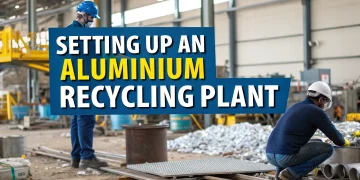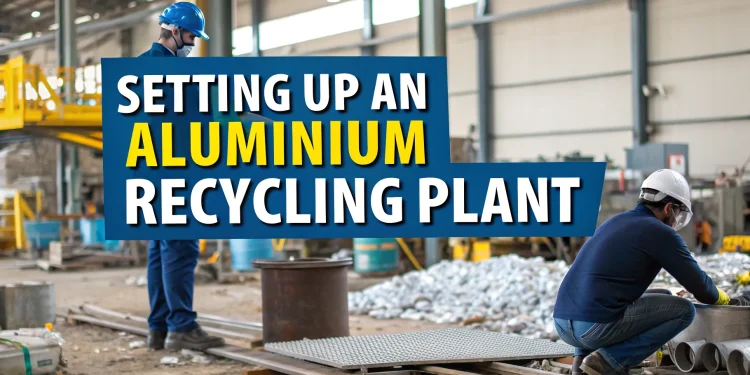Introduction: Why Aluminium Recycling is the Future of Manufacturing
Aluminum is a vital metal for various sectors like construction, automobiles, packaging, and electronics due to its lightweight, corrosion-resistant, and recyclable properties. Its ability to be infinitely recycled without degradation makes aluminum one of the most sought-after metals globally. Concerns for the environment have shifted the focus towards recycled aluminum, which, compared to primary aluminum recycling production, provides a more sustainable solution, as the latter is energy and resource-intensive.
Startups can now capitalize on the booming opportunity that India’s aluminum production and consumption provide. The aluminum recycling business is not only a profitable venture, but it also helps the environment and promotes sustainable practices, all of which align with circular economies and environmental regulations.
This guide provides a comprehensive approach to achieving infrastructure and operational milestones for business setup and optimizing processes. The guide also aims to help garner a better understanding and evaluate market demand.
View our Handbooks on Steel, Iron, Ferrous, Non-Ferrous Metals with Casting and Forging, Aluminium, Ferroalloys Technology
Global And Indian Market Outlook For Aluminium Recycling
There are great economic and ecological benefits to aluminium recycling, and as a result, the sector is expanding rapidly. Industry reports estimate that the global aluminium recycling market will be surpass USD 120 billion by 2030, increasing at a CAGR of 7% from 2025 to 2030. The growing automotive and construction industries, increasing carbon footprint regulations, and urbanization are responsible for the surge.
India is reflecting the global trend because of the increase in the industrial base and the large consumption of aluminium products. Aluminium consumption in India is projected to increase to 10 million tonnes per year by 2030, with a demand of 35-40% being fulfilled by recycled aluminium. Government resource efficiency regulations, increasing sustainability awareness, and a lower cost of recycled metal compared to primary aluminium are driving this change.
Aluminium is being integrated into new electric vehicles and into the aerospace industry as well as into construction and renewable energy infrastructure. Recycling facilities established today will be able to meet the growing demand of the future, while also saving a significant amount of energy and reducing carbon emissions.

Related: How to Start an Aluminium Recycling Business
Step 1: Understanding the Market Potential
Researching the aluminium market is crucial before setting up a recycling facility. The global market for aluminium recycling is expected to grow steadily over the next five years, driven by the packaging, transportation, consumer products, and infrastructure sectors. In India, the market is expanding at a much faster pace due to urbanization, an increase in industries, and the shift towards sustainable manufacturing.
Entrepreneurs need to recognize that over 30% of aluminium is recycled, and this trend is rising. Such a growing opportunity is promising for the recycling plants as there is a continuous rise in need.
Step 2: Identifying Sources of Aluminum Scrap
Every recycling facility depends on a consistent and steady supply of raw materials. In terms of aluminum recycling, the raw material is scrap, which can be classified into two categories: post-consumer scrap and industrial scrap. Post-consumer scrap consists of remnants from cans, household items, automobile parts, and wires used in electronic appliances. Industrial scrap is generated from the remainder, surplus, or inferior materials in the course of the manufacturing operations.
For a productive recycling unit, businesspersons must find and sustain relationships with scrap sellers, industries, local collection agencies, and even the municipal waste management services. Establishing a dependable scrap sourcing network is the backbone of efficient operation of the plant.
Step 3: Choosing the Best Location and Infrastructure
The location of the plant is important for the operational efficiency of the business. An entrepreneur will have lower logistics costs if the site that he or she selects is near the sources of scrap and the end-user markets. In addition to the plant’s building, there should be enough land set aside for the storage yards, processing zones, and administrative offices. It is also vital that necessary operating systems such as electricity, water, roads, and waste disposal systems are in place.
Environmental compliance is also important to recycling because the industry uses equipment such as furnaces and machines. Therefore, along with stringent adherence to local laws, there is also the need to secure clearances from the pollution control boards, which is crucial to the business process.
Step 4: Learning About the Aluminum Recycling Process
Each segment of the recycling industry has a specific procedure around which its operations revolve. Aluminum recycling has four steps: collection and sorting, cleaning, melting, and casting. Once scrap is gathered, it is taken to a sorting line where ferrous and non-ferrous materials are separated. This step is followed by scrapping cleaning, which is the removal of coatings, paints, and other impurities.
The cleaned scrap is then placed into furnaces where it is melted under strict temperature controls. The melting phase only uses around 5% of the energy needed to create primary aluminum, making it greatly cost-effective and eco-friendly. The molten aluminum is then cast into ingots and billets or other semi-finished shapes. These are given to industries for further value addition.
Related: How DPC Aluminium Wire Is Made: Step-by-Step Process Explained
Step 5: Machinery and Technology Acquisition
In the recycling industry, technology usually refers to the collection of machines and equipment which serve specific functions. Entrepreneurs in this section of the market need to acquire reliable pieces of equipment such as shredders, sorting lines, rotary or reverberatory furances, casting machines, and filtration systems. Automation is increasingly being adopted in the recycling sector to improve efficiency and reduce labor dependency.
Aluminum recycling companies are able to maintain better process control and achieve a higher yield in operations by partnering with specialized technology providers. The right equipment also improves the recycling process by ensuring steady product quality and lowering energy costs, which also improves the operational profits of the company.
Step 6: Setting Up a Skilled Workforce and Training
The recycling industry needs a mix of skilled and unskilled workers. Staff training is essential for operating the furnaces, conducting quality tests, and performing machine maintenance. These roles require specialized technical skills. Less skilled positions, like collection, segregation, and loading, can be filled with general labor. These roles require basic skills, education, and training. Safety training is also critical since the recycling process involves high temperatures and other risks. Overall, training helps improve productivity and reduces risks.
Step 7: Compliance and Quality Control Checks
In the recycling industry, quality is an essential differentiator. Recycled aluminium is required to meet industry standards for purity and alloy composition. It is necessary to have laboratories for chemical and mechanical analysis to maintain quality. Businesses also have to follow the environmental and safety standards.
These include the installation of emission control devices, waste treatment, and the implementation of safe procedures for handling materials. Compliance with the standards aids in obtaining certifications and builds trust among clients.
Step 8: Formulating a Marketing and Distribution Plan
Recycled aluminum is utilized in a wide array of industries, including automotive, aerospace, beverage can production, and electrical conduction. Entrepreneurs in these industries need to establish partnerships with manufacturers who need aluminum at scale and position their firms as trusted vendors of quality recycled aluminum.
Networking with manufacturers is a good way to get visibility, and now, online and at trade fairs, is a good value. The most effective way to get long-term buy contracts is to ensure a consistent supply at competitive rates.
Step 9: Future Prospects of Aluminium Recycling
The growth potential of aluminum recycling is exceptional. The world’s industries need to manage their carbon footprints, and secondary aluminum is cherished. The demand for aluminum is expected to spike substantially, especially with the rise in electric vehicles and infrastructure for renewable energy. Entrepreneurs who later invest in advanced recycling plants will enjoy the high demand and will position themselves as forerunners in a sustainable economy.
For more information check out this video
Role of NIIR Project Consultancy Services (NPCS)
Niir Project Consultancy Services (NPCS) is known for preparing detailed Market Surveys coupled with Techno-Economic Feasibility Reports, guiding an entrepreneur in each step of an investment. NPCS provides support in covering all business planning essentials like the manufacturing method, required raw materials, plant layout, investment costs, and finances, among others. NPCS also helps in determining the viability of setting up new industries or diversifying into recycling and manufacturing projects.
Find the Best Idea for Yourself With our Startup Selector Tool
Conclusion
Starting an aluminium recycling plant requires a structured approach that combines market research, infrastructure development, technology adoption, and quality assurance. While the process involves several stages, each one is critical for building a sustainable and profitable enterprise. With rising global demand for recycled aluminium, entrepreneurs have an opportunity to enter a sector that promises both economic returns and environmental benefits. By following the steps outlined above and leveraging expert consultancy support, startups can establish a strong presence in this high-potential industry.


















